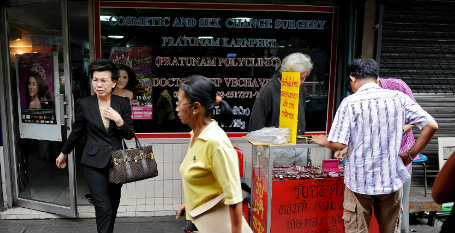Some LGBT rights activists remain skeptical even as Thailand’s new constitution that is being drafted will include a clause to protect the rights of transgender and gay communities and ensure that they receive fairer legal treatment.
"We are putting the words 'third gender' in the constitution because Thai society has advanced,” Kamnoon Sittisamarn, spokesman for the Constitution Drafting Committee told Reuters recently.
“There are not only men and women, we need to protect all sexes. We consider all sexes to be equal," he told the news agency which also reported that “the new measure would ensure all sexual identities were protected under the constitution and treated equally by the law.”
The committee was put together by the military to prepare a new constitution after the previous one was scrapped following a coup that overthrew a civilian government past May. The “new measure” is to be submitted to the National Reform Council by April and will need to be formally approved by the ruling junta.
Some gay rights activists welcomed the decision to include the term "third gender" in the new constitution while others remain skeptical saying it does not necessarily translate into reality.
"It would treat all citizens equally and help to protect from discrimination," gay activist Natee Teerarojjanapongs told Reuters.
Bangkok-based “The Nation” newspaper even pointed out that Thailand’s new constitution is now set to legally recognizing trans* people by using the term "third gender" for the first time in its constitution.
However, the Associated Press reported that “formal and legal acceptance for gay and transgender people (in Thailand) is still limited.”
It quoted Chalidaporn Songsamphan, a political scientist and gender studies expert at Bangkok's Thammasat University as saying: "While the charter will become a tool people can use to fight for their rights, it doesn't mean that the problems of gender biases, discrimination or harassment will go away."
The United Nations Development Programme and the U.S. Agency for International Development in their ‘Being LGBT in Asia’ Thailand Country Report issued last September highlighted “a contradiction between Thailand’s public face of tolerance toward LGBT communities and the reality of discrimination toward them.”
The acceptance by society at large of LGBT members is still perceived to be low even though the country officially and openly markets itself as a gay-friendly tourist destination, it said.
While the law prohibits discrimination against citizens but there are no specific laws to stop LGBT related discrimination and Thai law does not recognize same-sex unions.
Earlier moves to draft a same-sex marriage law received much bipartisan support in parliament before it was unfortunately sidelined with parliament’s dissolution, a general election that was nullified and a caretaker government that has removed by a military coup.
Some LGBT rights activists remain skeptical even as Thailand’s new constitution that is being drafted will include a clause to protect the rights of transgender and gay communities and ensure that they receive fairer legal treatment.
"We are putting the words 'third gender' in the constitution because Thai society has advanced,” Kamnoon Sittisamarn, spokesman for the Constitution Drafting Committee told Reuters recently.
“There are not only men and women, we need to protect all sexes. We consider all sexes to be equal," he told the news agency which also reported that “the new measure would ensure all sexual identities were protected under the constitution and treated equally by the law.”
The committee was put together by the military to prepare a new constitution after the previous one was scrapped following a coup that overthrew a civilian government past May. The “new measure” is to be submitted to the National Reform Council by April and will need to be formally approved by the ruling junta.
Some gay rights activists welcomed the decision to include the term "third gender" in the new constitution while others remain skeptical saying it does not necessarily translate into reality.
"It would treat all citizens equally and help to protect from discrimination," gay activist Natee Teerarojjanapongs told Reuters.
Bangkok-based “The Nation” newspaper even pointed out that Thailand’s new constitution is now set to legally recognizing trans* people by using the term "third gender" for the first time in its constitution.
However, the Associated Press reported that “formal and legal acceptance for gay and transgender people (in Thailand) is still limited.”
It quoted Chalidaporn Songsamphan, a political scientist and gender studies expert at Bangkok's Thammasat University as saying: "While the charter will become a tool people can use to fight for their rights, it doesn't mean that the problems of gender biases, discrimination or harassment will go away."
The United Nations Development Programme and the U.S. Agency for International Development in their ‘Being LGBT in Asia’ Thailand Country Report issued last September highlighted “a contradiction between Thailand’s public face of tolerance toward LGBT communities and the reality of discrimination toward them.”
The acceptance by society at large of LGBT members is still perceived to be low even though the country officially and openly markets itself as a gay-friendly tourist destination, it said.
While the law prohibits discrimination against citizens but there are no specific laws to stop LGBT related discrimination and Thai law does not recognize same-sex unions.
Earlier moves to draft a same-sex marriage law received much bipartisan support in parliament before it was unfortunately sidelined with parliament’s dissolution, a general election that was nullified and a caretaker government that has removed by a military coup.

